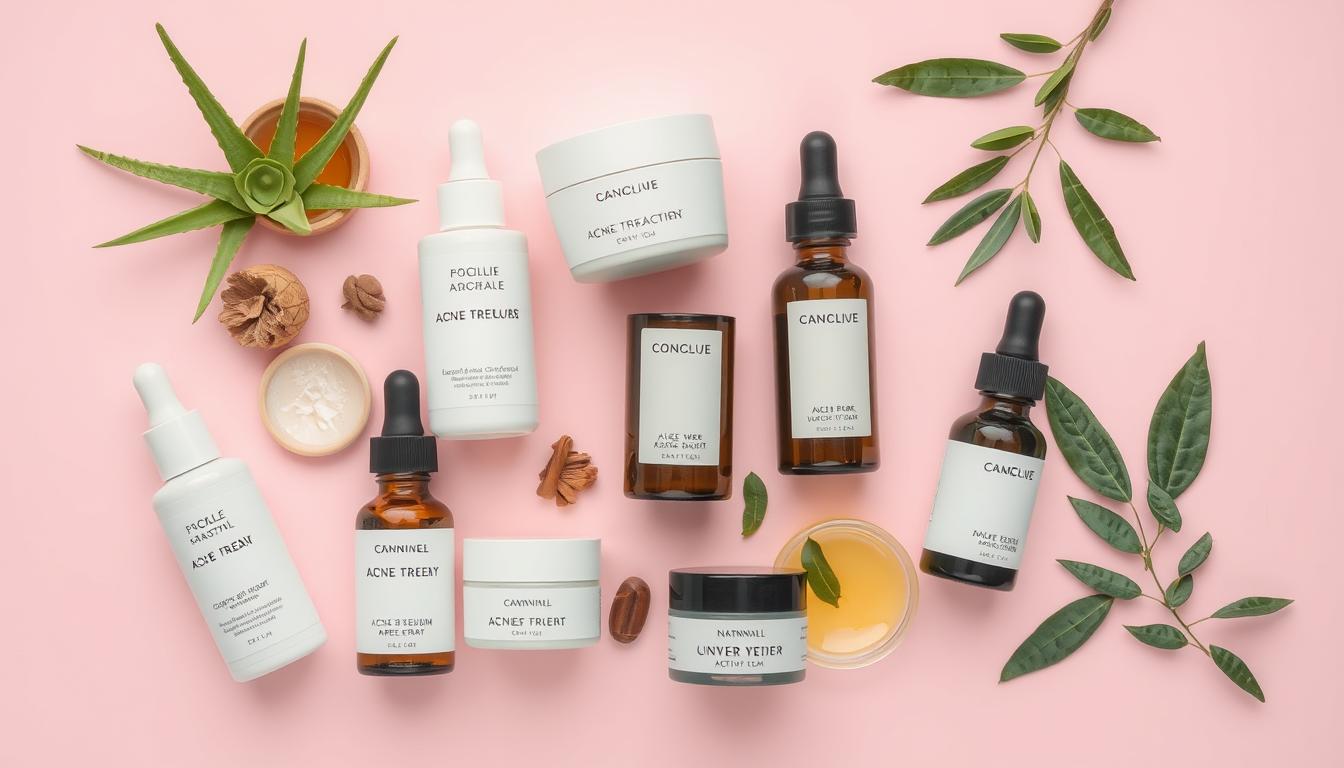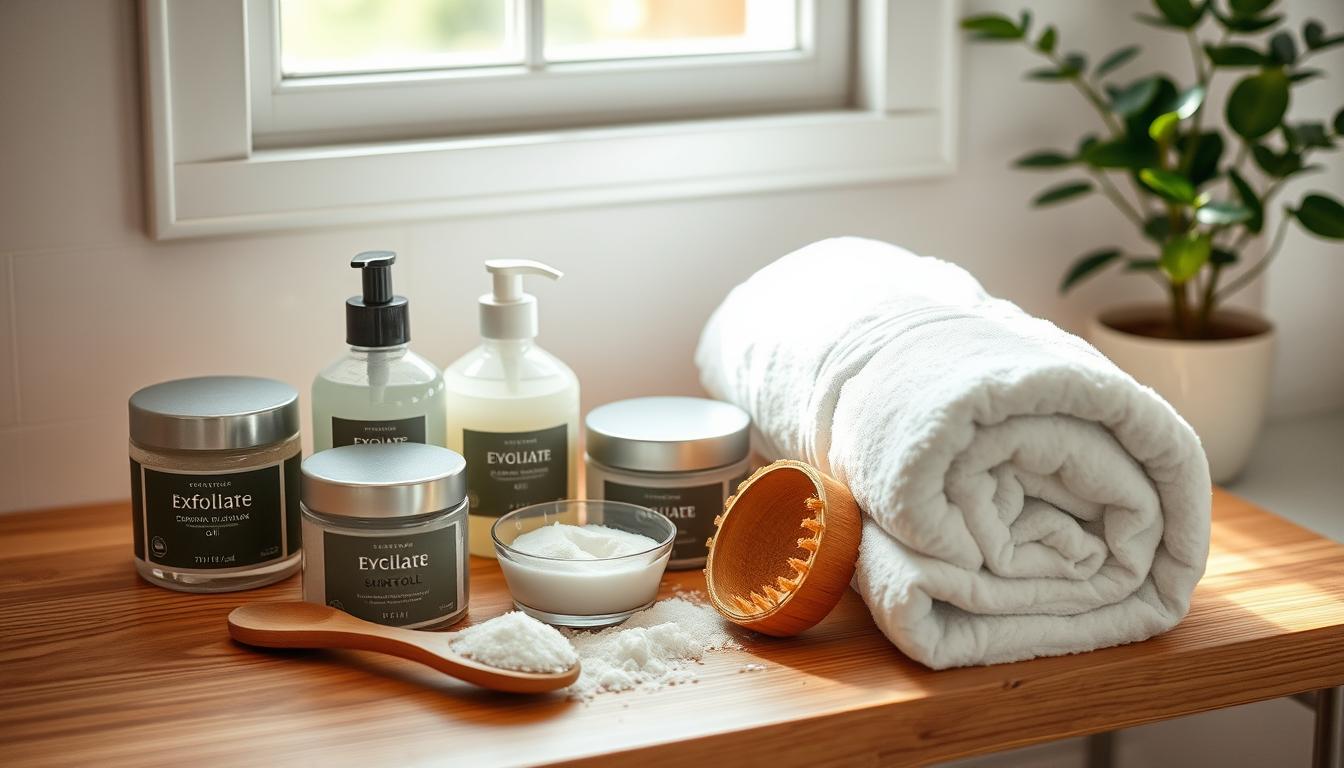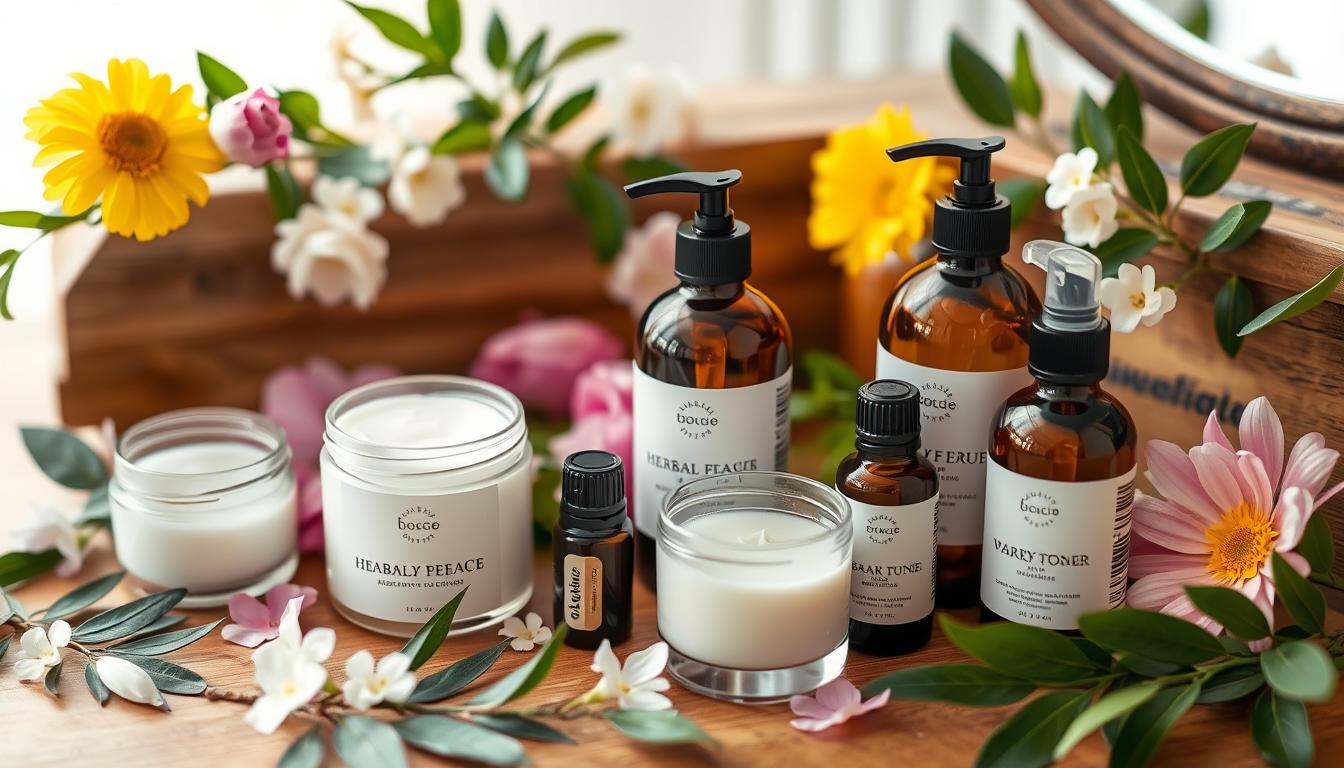Dealing with acne can be tough and frustrating. But, there are many effective treatments to help you get clearer, healthier skin. This guide will cover a wide range of options, from over-the-counter products to prescription meds and natural remedies. You’ll learn how to find the best treatment for your skin type and needs.
Key Takeaways
- Discover a variety of acne treatment options, including over-the-counter, prescription, and natural remedies.
- Understand the underlying causes and different types of acne to make informed treatment decisions.
- Learn about the effectiveness and potential side effects of various acne medications and treatments.
- Explore how lifestyle factors, such as diet and stress management, can impact acne and its management.
- Determine when it’s necessary to seek professional help from a dermatologist for severe or persistent acne.
Understanding Acne: Causes and Types
Acne is a common skin issue that affects many people. To manage and treat it, knowing the causes and types is key. We’ll look at what causes acne, its different forms, and how hormones affect it.
Common Causes of Acne
Many things can lead to acne, like genetics, hormonal changes, too much oil, and bacteria. Genetics can make some people more likely to get acne. Hormonal shifts, like during puberty or pregnancy, can also cause more oil, leading to clogged pores and breakouts.
Different Types of Acne
- Whiteheads: Closed comedones that occur when pores become clogged with oil and dead skin cells.
- Blackheads: Open comedones that appear as dark spots on the skin due to oxidized oil and debris.
- Papules: Small, red, and inflamed bumps on the skin caused by clogged pores and bacteria.
- Pustules: Pus-filled lesions that develop when the pore becomes infected with bacteria.
- Nodules: Hard, painful, and deep-seated lumps under the skin that are often associated with hormonal acne.
- Cystic acne: Severe, painful, and inflamed lesions that develop deep within the skin, often requiring professional treatment.
The Role of Hormones
Hormones are a big part of acne, especially when they change a lot. Androgen hormones, like testosterone, make the oil glands work too hard. This can lead to clogged pores and breakouts. This is common during puberty, pregnancy, and in conditions like PCOS.
Knowing about acne’s causes, types, and hormone impact helps people manage their skin. They can find the best skincare solutions for their acne.
Over-the-Counter Acne Treatments
If you’re dealing with acne, over-the-counter (OTC) treatments can be a great start. These products have active ingredients that target acne causes, like excess oil and clogged pores. Let’s look at some effective OTC acne treatment options.
Topical Retinoids
Retinoids, made from vitamin A, are a popular choice. They work by promoting cell turnover, which unclogs pores and reduces blemishes. You can find adapalene in many OTC products, making them easy to get.
Benzoyl Peroxide Products
Benzoyl peroxide is known for fighting acne. It kills bacteria and dries out blemishes. OTC products come in different strengths, so you can choose what’s right for you. Start with a lower concentration to avoid dryness or irritation.
Salicylic Acid Treatments
Salicylic acid is another strong fighter against acne. It exfoliates the skin, unclogging pores and reducing blackheads and whiteheads. You can find it in cleansers and spot treatments, offering a targeted approach.
Adding these OTC acne treatments to your routine can be affordable and easy. Always patch test new products and follow the instructions to get the best results and avoid side effects.
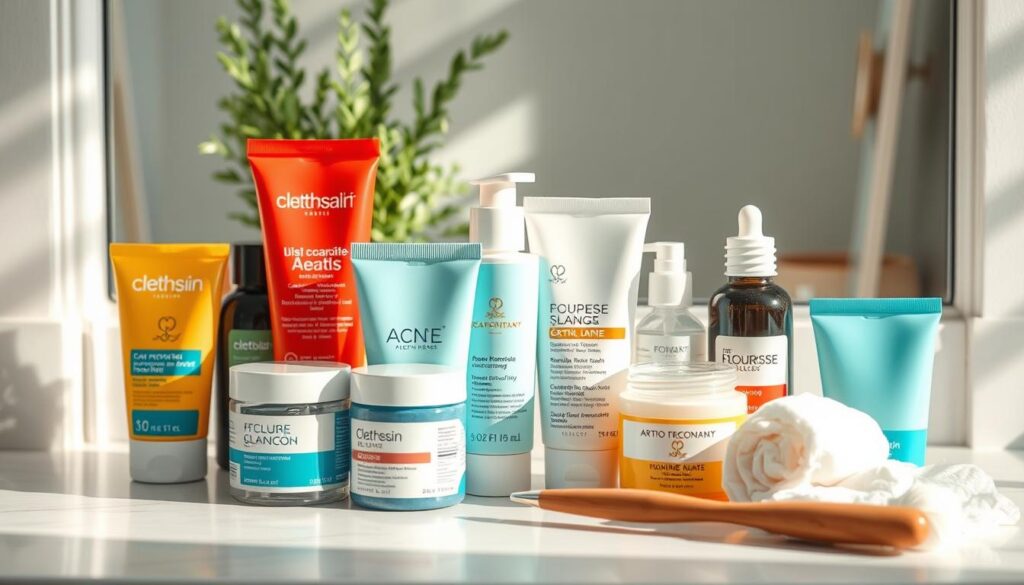
Prescription Acne Medications
When over-the-counter treatments don’t work, your dermatologist might suggest stronger options. These prescription medications can tackle the root causes of your acne. Let’s look at the different types available.
Oral Antibiotics
Oral antibiotics are often used for serious acne. They fight the bacteria that cause acne. Doxycycline, minocycline, and erythromycin are common choices. These drugs help reduce inflammation and stop new breakouts.
Topical Prescription Treatments
Your dermatologist might also suggest topical treatments. Prescription-strength retinoids, like tretinoin or adapalene, clear pores and reduce inflammation. Benzoyl peroxide or clindamycin target bacteria causing acne.
Hormonal Treatments
For hormonal acne, treatments like birth control pills or spironolactone are used. They balance hormones and lower sebum, preventing clogged pores and breakouts.
Remember, prescription medications can have side effects. Your dermatologist will help find the best treatment for you. Regular check-ups are key to adjusting your treatment as needed.
| Prescription Acne Medication | Mechanism of Action | Potential Side Effects |
|---|---|---|
| Oral Antibiotics (e.g., doxycycline, minocycline) | Reduce the growth of acne-causing bacteria | Gastrointestinal issues, photosensitivity, antibiotic resistance |
| Topical Retinoids (e.g., tretinoin, adapalene) | Unclog pores, reduce inflammation, and promote cell turnover | Skin irritation, dryness, photosensitivity |
| Hormonal Treatments (e.g., birth control, spironolactone) | Regulate hormone levels and reduce sebum production | Hormonal side effects, irregular menstrual cycles |
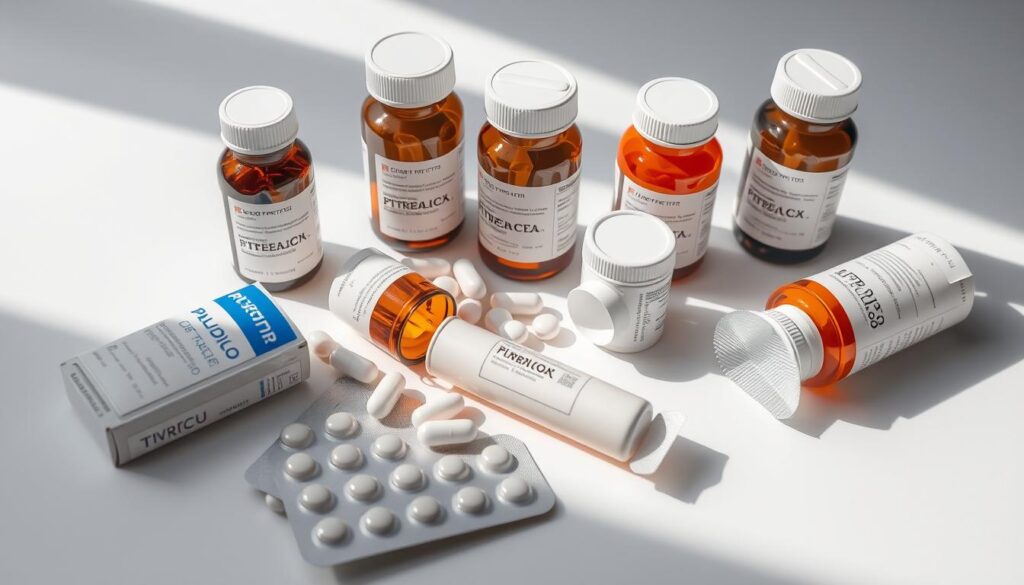
“Prescription acne medications can be a game-changer for individuals struggling with persistent or severe breakouts. However, it’s crucial to work closely with your dermatologist to ensure the right treatment plan for your unique needs.”
Natural and Home Remedies for Acne
Many people use natural and home remedies to fight acne. These methods are often gentler and can help some people. Let’s look at a few natural and home remedies that might improve your skin.
Tea Tree Oil
Tea tree oil is known for its antibacterial properties. It can fight bacteria that cause acne, reducing inflammation and helping your skin heal. Mix it with a carrier oil like coconut or jojoba oil and apply it to your skin. Start with a small amount and increase it as your skin gets used to it.
Honey and Cinnamon Mask
Honey and cinnamon together make a soothing mask for acne. Honey fights bacteria, while cinnamon reduces inflammation. Mix equal parts of raw honey and ground cinnamon, apply it to your face, and leave it on for 10-15 minutes before rinsing with warm water.
Aloe Vera
Aloe vera is great for calming and soothing the skin. Its gel can reduce redness, inflammation, and irritation from acne. Just apply a thin layer of fresh aloe vera gel to the affected areas and let it absorb.
Remember, natural remedies might not work as well as prescription treatments. Always talk to a dermatologist to find the best acne management plan for you.

Skincare Routines for Acne-Prone Skin
Keeping a consistent skincare routine is key for acne-prone skin. The right cleansing, moisturizing, and exfoliation can reduce breakouts. This helps you get healthier, clearer skin.
Importance of Cleansing
Cleansing is the base of fighting acne. Use a gentle cleanser that removes oil, dirt, and impurities without drying out your skin. Stay away from harsh cleansers that can make acne worse.
Moisturizing Essentials
Moisturizing is crucial, even for acne-prone skin. Choose lightweight, non-comedogenic moisturizers that won’t clog pores. Hyaluronic acid and ceramides are good for keeping your skin hydrated without causing more breakouts.
Exfoliation Tips
Gentle exfoliation can clear pores and improve acne-prone skin. But, be careful not to overdo it. Over-exfoliating can irritate your skin and lead to more breakouts. Use chemical exfoliants like salicylic acid or lactic acid, and exfoliate 1-2 times a week.
| Acne Skincare Step | Key Considerations |
|---|---|
| Cleansing | Use a gentle, non-irritating cleanser to remove excess oil, dirt, and impurities without stripping the skin. |
| Moisturizing | Choose a lightweight, non-comedogenic moisturizer to hydrate the skin without clogging pores. |
| Exfoliation | Incorporate chemical exfoliants like salicylic acid or lactic acid 1-2 times per week to unclog pores. |
By adding these essential steps to your routine, you can manage acne-prone skin. This helps you achieve a clearer, healthier-looking complexion.
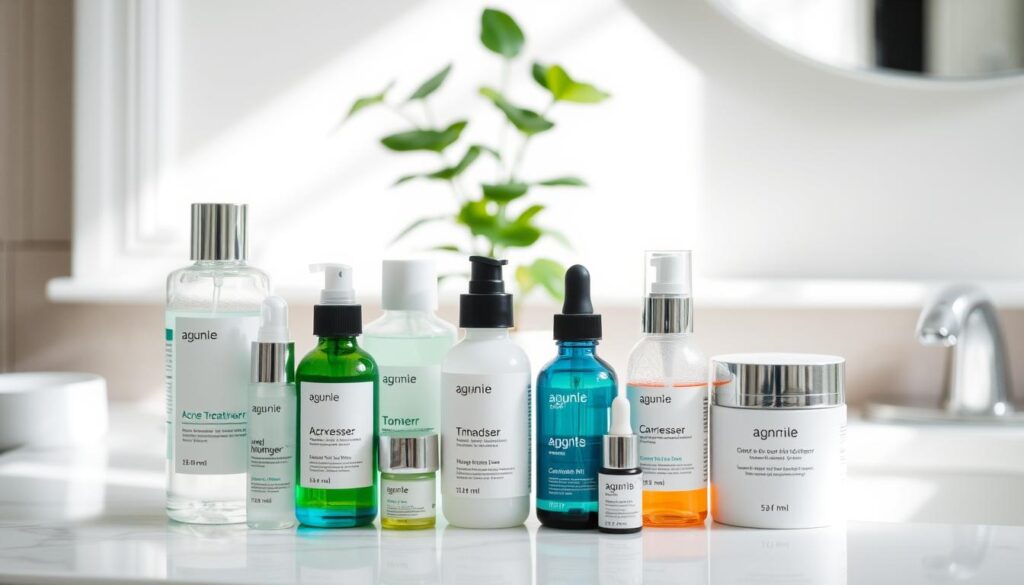
Professional Acne Treatments
When home remedies don’t work, it’s time to try professional acne treatments. These advanced solutions are given by dermatologists or estheticians. They can tackle many acne problems, from tough breakouts to scars.
Chemical Peels
Chemical peels are a top choice for treating acne. They use acids to remove dead skin cells. This unclogs pores, reduces inflammation, and makes skin look better.
Stronger peels can also lessen acne scars.
Laser Therapy
Laser therapy fights acne’s inflammation and redness. It uses light to kill acne-causing bacteria and boost collagen. This makes skin look smoother.
It’s great for cystic acne or hard-to-treat spots.
Microneedling
Microneedling uses fine needles to make tiny injuries on the skin. This starts the healing process, making new collagen and elastin. It’s good for acne scars, making them less noticeable.
Choosing professional acne treatments needs a dermatologist or skincare expert. They’ll create a plan for your skin. With the right treatments, you can get clear, healthy-looking skin.
Lifestyle Changes for Acne Management
Healthy lifestyle changes can help fight acne. This includes diet, nutrition, stress management, and sleep. These changes can work with your treatments for better results.
Diet and Nutrition
What you eat affects your skin. Foods like dairy and sugary carbs can cause more breakouts. Eating fresh fruits, veggies, and lean proteins helps control hormones and inflammation.
- Eat more foods high in antioxidants like berries and leafy greens.
- Reduce processed, sugary, and fatty foods.
- Drink lots of water every day.
Stress Management Techniques
Stress can make acne worse by causing more oil and inflammation. Find ways to relax and keep your skin healthy.
- Try meditation, deep breathing, or yoga to relax.
- Exercise regularly to release stress and feel good.
- Make time for activities that help you relax and feel refreshed.
Sleep Hygiene
Good sleep is key for healthy skin, including acne management. Aim for 7-9 hours of sleep each night to help your body heal and regulate hormones.
- Keep a regular sleep schedule, even on weekends.
- Have a calming bedtime routine to get ready for sleep.
- Stay away from screens and exciting activities before bed.
Adding these lifestyle changes to your routine can help manage acne better. You’ll be on your way to clearer, healthier skin.
Myths About Acne Treatments
There are many wrong ideas about acne that can harm your skin. It’s important to know the truth about these myths. This way, you can choose the best treatments for your skin and get the clear skin you want.
Common Misconceptions
Many people think acne comes from dirty skin. But, acne is caused by hormones, genetics, and bacteria. Washing your face too much can make acne worse by upsetting your skin’s balance.
Some think acne only happens in teens. But, it can also hit adults. Acne can affect anyone, and treatments should match each person’s skin.
Debunking Popular Myths
Some think toothpaste can cure acne. But, it can dry out your skin and cause irritation. Always use proven acne treatments, not toothpaste.
Many believe popping pimples is the best fix. But, it can make things worse by causing inflammation and scarring. It’s better to use treatments suggested by dermatologists.
By knowing and debunking these myths, you can tackle your acne with confidence. This will help you make better choices for your skin.
“Separating fact from fiction is key to effective acne management. Understanding the truth behind common myths can help you make informed choices and achieve the clear, radiant skin you desire.”
When to Seek Professional Help
Over-the-counter and home remedies work well for mild to moderate acne. But, sometimes you need a dermatologist’s help. Knowing when to seek professional help is key for clear skin.
Signs You Should Consult a Dermatologist
Severe, cystic acne that doesn’t get better with your current treatment means it’s time to see a dermatologist. Cystic acne has deep, painful spots that need strong treatments. Also, if your acne is causing scars or emotional problems, a dermatologist can help.
Treatment Plans for Severe Acne
Dermatologists use a detailed plan to treat severe acne. They might use oral medications like antibiotics or hormonal treatments. They also use topical creams or gels with retinoids, benzoyl peroxide, or other ingredients.
For cystic acne, they might suggest intralesional injections or isotretinoin. This powerful oral medication can greatly reduce acne severity.
Importance of Follow-Up Care
Managing acne well is a long-term effort. Regular check-ups with your dermatologist are essential for clear skin. They will adjust your treatment and guide you on skincare.
Regular visits help keep your acne under control. They also prevent future problems or scarring.

